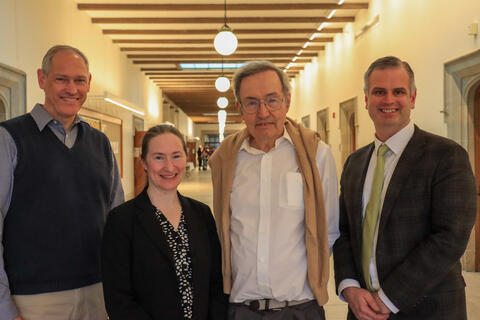
Professor Emeritus Robert Crabtree sat unassumingly in the front row of a crowded lecture hall, listening attentively and jotting notes as three guest speakers lectured on organometallic chemistry. One might mistake him for an ordinary audience member gathering ideas for his next project if they did not know the Robert Howard Crabtree Lecturers, Professors Melanie Sanford, Shannon Stahl, and Paul J. Chirik, were there to honor him.
They were awarded the named lectureships in 2021, 2022, and 2023, respectively, but were only able to attend in person recently as COVID restrictions subsided. Consequently, the Department of Chemistry hosted a symposium to honor the awardees and Crabtree.
The Crabtree lectureship was established in 2020 at the behest of admiring alumni of the Crabtree Lab looking to honor their faculty advisor in perpetuity long after his retirement.
As only the department’s fifth endowed lectureship, “[it’s] an indication of how rare it is to be recognized in this way,” said Nilay Hazari, John Randolph Huffman Professor of Chemistry and symposium organizer. “You have to not only be scientifically excellent, but you have to have connected to this department in a deep and meaningful way.”
Crabtree, C.P. Whitehead Professor of Chemistry Emeritus, is a remarkable scientist who “generates new and creative ideas at an incredible rate and is able to make connections that most of us can’t see,” said Hazari. For example, Crabtree proposed that there were copper(I) receptors in our nose simply because we can smell thiols so well. Throughout his career, he became a seminal figure in organometallic chemistry. He was involved in many important discoveries – including the Crabtree catalyst for hydrogenation and the first examples of intramolecular C-H bond activation – and co-founded the Yale Solar Group.
In addition to enhancing the legacy of the Chemistry department through his research, Crabtree also improved the work of his colleagues through collaboration. He has co-authored papers with sixteen Yale faculty members.
His scientific prowess elevated inorganic chemistry from a relative afterthought when he started at Yale in 1977 to a respected research area of its own right in the department by the time he retired in 2020.
For these reasons, the department named the only endowed lectureship in inorganic chemistry after him.
On February 23, the Chemistry community celebrated the first three Crabtree lecturers and heard how they connect fundamental inorganic and organometallic chemistry to various applications, like energy storage systems, green chemistry, and drug discovery.
The inaugural Crabtree lecturer Melanie Sanford ‘96 is an undergraduate alumnus of the Crabtree Lab and the Moses Gomberg Distinguished University Professor of Chemistry and Arthur F. Thurnau Professor at the University of Michigan. Her lab works in the areas of C-H functionalization, high valent organometallic complexes, fluorination, and flow batteries. In addition to her work, she shared the impact Crabtree had on her career and life.
Shannon Stahl is a professor of chemistry and the Steenbock Professor of Chemical Sciences at the University of Wisconsin-Madison. His lab investigates oxidation catalysis, electrocatalysis, green chemistry, and electrochemical energy storage and conversion.
Paul J. Chirik, Edwards S. Sanford Professor of Chemistry and Associate Chair of the Department of Chemistry at Princeton University, specializes in catalysis using first row-metals. He spoke about catalysis with earth-abundant metals for drug discovery and manufacture.
All of these chemists are deserving of the Crabtree lectureship award as they exemplify the creativity, prolificity, and enthusiasm of its namesake.
Although Crabtree is formally retired, there seems to be no slowing down for him. As witnessed by his keen notetaking during the symposium, he is still fully engaged in research. He attends research meetings, mentors students, and proposes creative ideas for ongoing collaborations with colleagues.
Learn more about the life and work of Robert Crabtree.